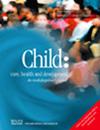The 24-Hour Activity Checklist for Cerebral Palsy: Translation, Content Validity and Test–Retest Reliability of Portuguese Versions
Abstract
Background
The importance of 24-h movement behaviour, including sleep, physical activity (PA) and sedentary behaviour (SB), has gained prominence due to its significant impact on the health and development of children, including those with cerebral palsy (CP). The 24-h activity checklist for CP, a tool developed in the Netherlands to monitor the activity in CP paediatric population, requires translation and cultural adaptation to Portuguese for use in Brazil and Portugal.
Methods
This cross-sectional methodological study involved translating and culturally adapting the 24-h activity checklist for CP into Brazilian Portuguese (BP) and European Portuguese (EP) languages. The process included forward translation, synthesis and backward translation, expert panel evaluation and pretesting. Brazilian and Portuguese experts appraised content validity, assessed by the individual item (I-CVI) and scale level content validity index scores (S-CVI/Ave). Sixty parents of children with CP participated in the test–retest analysis, reported with the Intraclass Correlation Coefficients (ICCs).
Results
I-CVI scores were higher than 0.78 for both versions. S-CVI/Ave scores were considered excellent for BP (0.91) and EP version (1.0). Expert's appraisal results in the inclusion of a question about sleep-related time indicators and the split of sleep, PA, and screen time questions for weekdays and weekends. Brazilian and Portuguese parents of children with CP reported understanding on instructions, questions, and answer options. The ICC values range from 0.81 to 0.99 and 0.6 to 0.98, for BP and EP, respectively.
Conclusions
The BP and EP versions of 24-h activity checklist for CP demonstrated good content validity and test–retest reliability, supporting its use in Brazil and Portugal. This tool can contribute to improving communication between families and healthcare professionals to monitor and develop tailored interventions for healthy movement behaviours in children with CP.

 求助内容:
求助内容: 应助结果提醒方式:
应助结果提醒方式:


